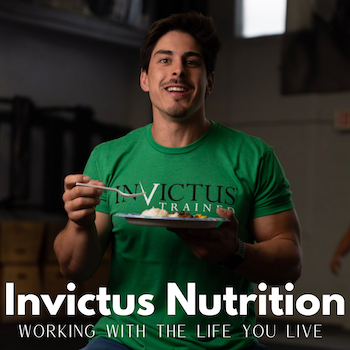
Want to Lose Weight? Try Maintenance Calories First
Written by Kirsten Ahrendt
I recently listened to a podcast that I really enjoyed and wanted to share some of my favorite takeaways. The podcast was targeted towards postpartum women that want to lose weight after having a baby. But guess what…the information they discussed was applicable to EVERYONE! Men and women, postpartum or not, if you want to lose 5# or 50#. So if you’re interested, give it a listen (at least the first 20 minutes). And if you’re short on time, read my takeaways below! If you are in the 60-day healthy habit challenge, a lot of these should sound familiar!
Practice Brave Podcast – Jordan Lips on Healthy Approaches to Changing Body Composition
TLWR (Too Long Won’t Read)?
- The key to sustainable weight loss is NOT in extreme caloric deficits
- The long way is the short way (this goes for weightloss, fitness, skill acquisition, your job, everything)
- “Earn your cuts” by creating sustainable healthy habits and a healthy relationship with food and hunger by existing at “maintenance” calorie volume for 4-6 months.
The #1 suggestion from this podcast for meeting body composition goals was…spend a longer time NOT in a caloric deficit.
Goal to Lose Weight
So if you’ve decided you want to lose weight and you immediately think “I need to eat less,” you’re not wrong, but it may not be the best place to start. If you are a person who has often tried “eating fewer calories” to lose weight and felt miserable or ended up “yo-yo’ing” back and forth between weight loss and weight gain, this may be an indicator that you need to need establish (or re-establish) healthy habits at BASELINE rather than under the stress of caloric deficit.
What is Caloric Deficit?
A caloric deficit is when we eat fewer calories than we expend in a day (calories in VS calories out). Generally, expending more than we take in is an agreed upon way to lose weight…until it’s not (take this too far and your body’s metabolism will slow down, your recovery and performance will tank, and you’ll feel like shit).
Maintenance Calories
At maintenance you consume enough calories to match your daily caloric needs to simply exist – you can calculate your # here! and your weight should trend neither up nor down by more than a couple pounds. So, why would eating & living at “maintenance” help you reach body composition goals?
Losing Weight is Like Playing Chess
Playing with caloric volume is just ONE variable that often gets used and abused. There are more factors to body composition. Imagine your body composition is like a chess board. If you memorize an exact sequence of movements, you MIGHT win a game, if you’re lucky. But until you understand the principles of how to play; like how each piece moves on the board, how to use a pawn effectively, how to make strategic sacrifices for the long term gain, you’ll never actually be PLAYING chess.
Weight loss is a lot like that. If you don’t understand how to keep yourself at maintenance, it means you don’t understand how to manipulate a variety of variables that you will need to understand in order to successfully execute a “cut”. In essence, you don’t understand the principles of how to play the “game” of weight loss or body composition.
The Benefits of Living at Maintenance
If existing at this volume of calories is foreign to you, Jason Lips, the podcast guest, suggests you should try it for up to 6 months prior to going into a “cut”. Some benefits of establishing a good baseline at “maintenance”:
- A decrease in high food focus or anxiety about going out
- You’ll learn to be less impacted mentally and emotionally by scale fluctuations
- You feel satiated on a regular basis
- You won’t stress about food 24/7 or feel hungry all the time (because you’re matching your energy needs)
- Momentary dietary “blips” like a high carb day or less nutritious meal, causes less stress because you know how to balance out carbs/protein/fat on another day to stay on track in the bigger overall picture of that week or month
- You’ll have learned the principles you need to build a healthy plate and sustain your energy i.e. – you know what it takes to fuel “living your best life” or live at “baseline”. From there, you have a better understanding of how to fluctuate above or below baseline.
You Don’t Need to Suffer!
Four to 6 months of consistent simple healthy habits spent at a “maintenance calories and lifestyle” can have a huge impact on weight and health and reaps many “easy gains”. Maximize these easy gains before you jump into more extreme caloric deficits to meet your body composition goals. They call this “earning the cut”, and it includes building habits such as:
- Sleeping enough
- Eating enough protein
- Increasing training (focused around hypertrophy strength)
- Increase cardiovascular activity (different from HIIT)
- Enough water
- Enough daily steps
These variables are like different chess pieces. Learn how moving one is different from moving another, and how each impacts you uniquely. Changing only the # of calories you eat is like trying to win a chess game by only moving the bishop. Consider all the pieces you have at your disposal to “win!” The 4-pillars of health are a pretty solid place to start – nutrition / movement / sleep / stress!
If you THINK you’re already crushing all of these things and you’ve “earned the cut”, I urge you to confirm it by actually tracking how many calories you eat in a day/week and make sure you’re not over/under your maintenance. More info on “tracking” below.
Final Considerations
Some final quick and dirty talking points from the podcast that stood out to me include:
- Moderate deficits will be more successful than extreme deficits.
- Take stock of how a deficit impacts your recovery (you may need more).
- Deficits are a form of stress on your body. You may need to decrease HIIT exercise and focus on hypertrophy strength training and walking when in a deficit to not over-stress the body (“stressed” is a less than ideal state when going for body composition changes).
- Some people need to learn to say “no” to things (“I am able to refrain from eating any cookies”).
- Some people need to learn to say “yes” to things and not feel guilty about it (“I can have one cookie, not the whole box”).
- The last supper mentality (“I can never have this”) is usually not beneficial.
- Body composition goals respond well to hypertrophy focused training (training focused on building lean muscle).
- Low carb diets on top of high volume HIIT training can be inflammatory (re: stress).
- The long way is the short way. Do it once rather than having to repeat and re-do.
Invictus Nutrition Program
We are interested to know what your experience with weight loss, calories, or simply your relationship to food is like! Drop us a line in the comments below!
